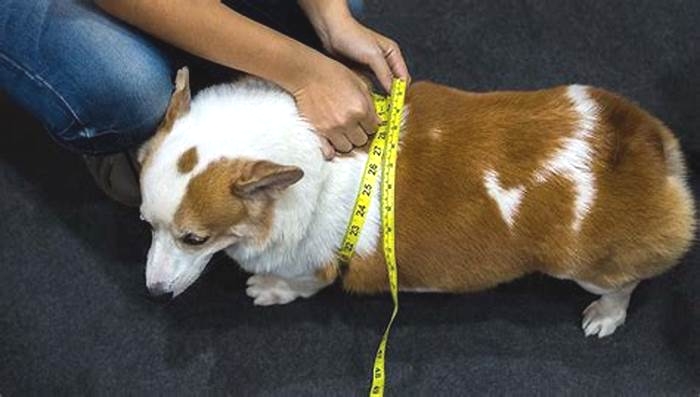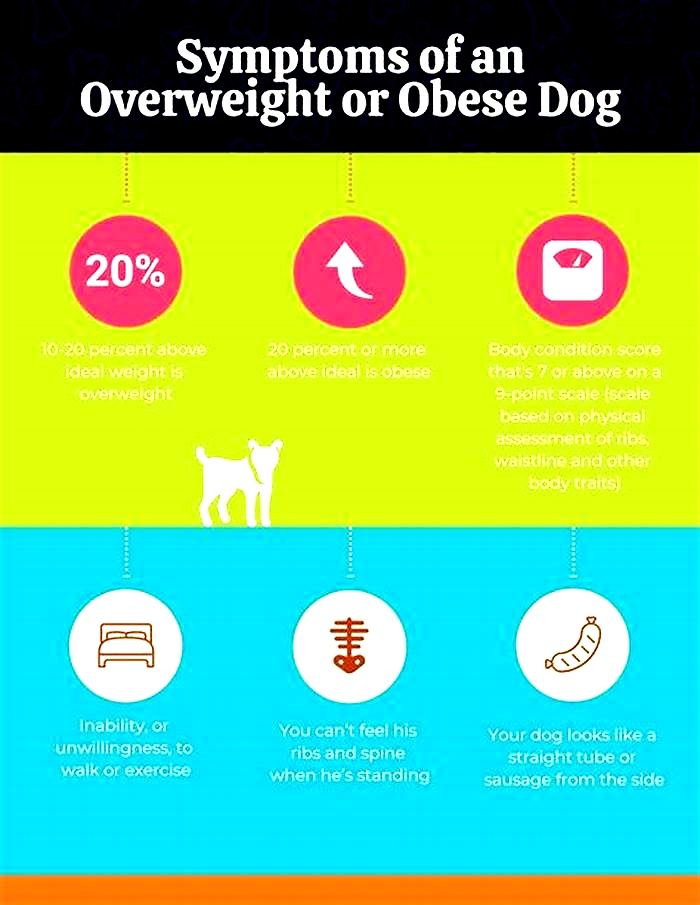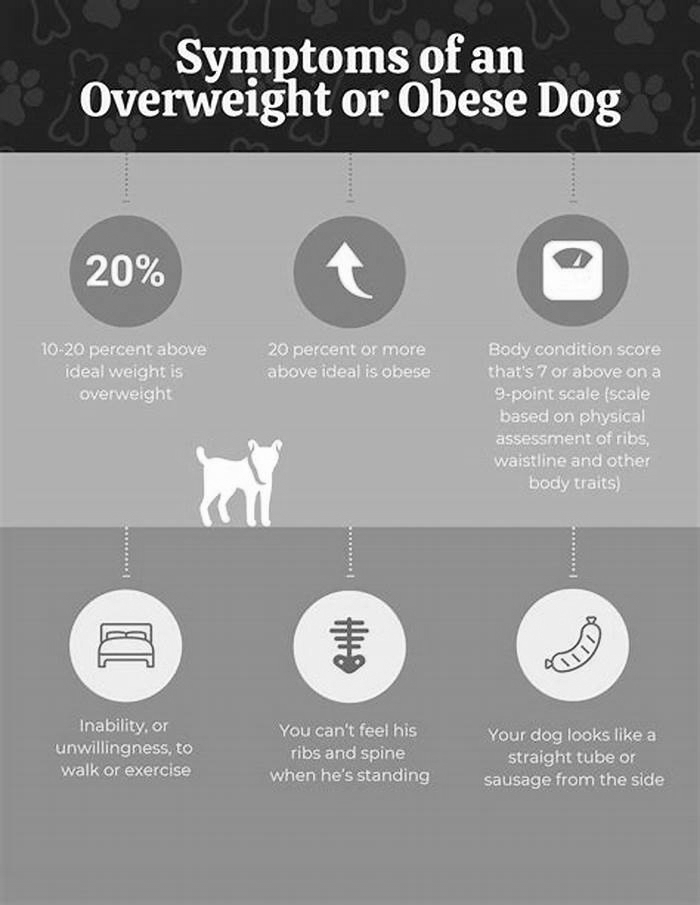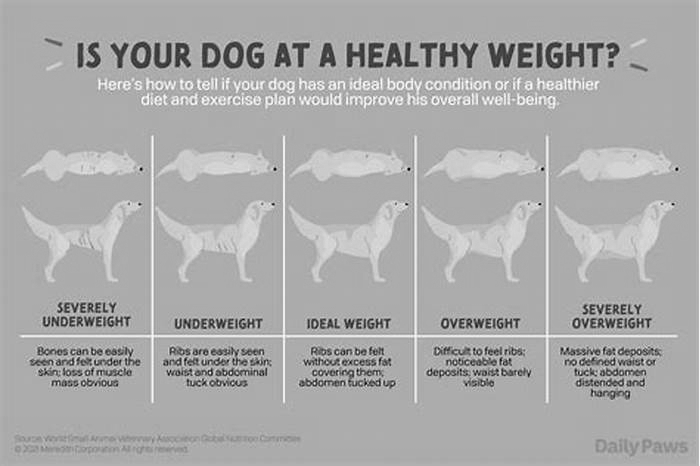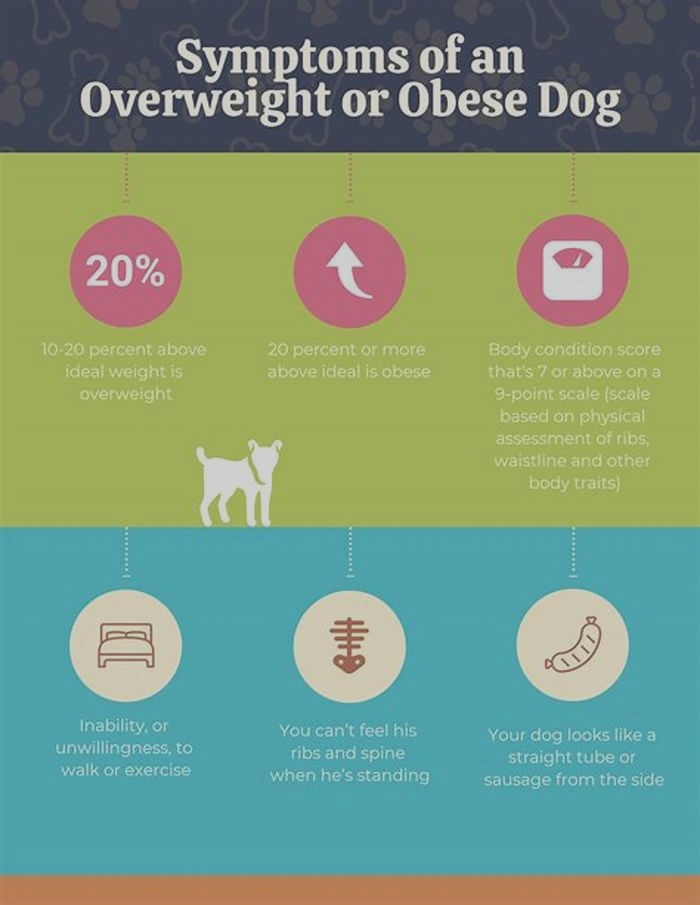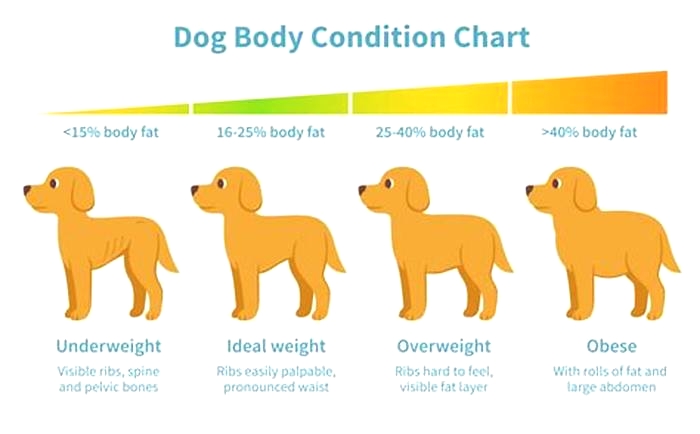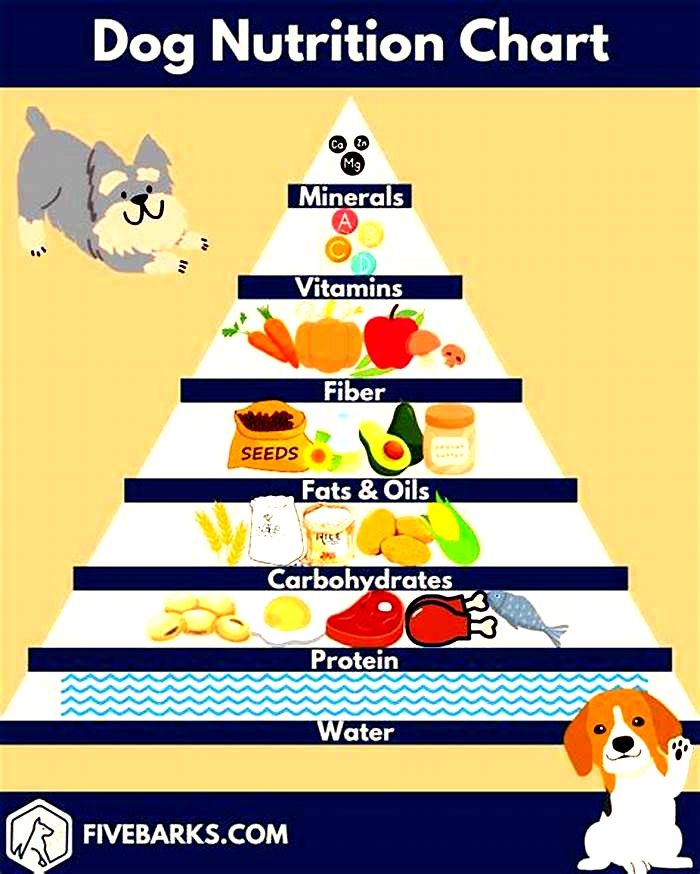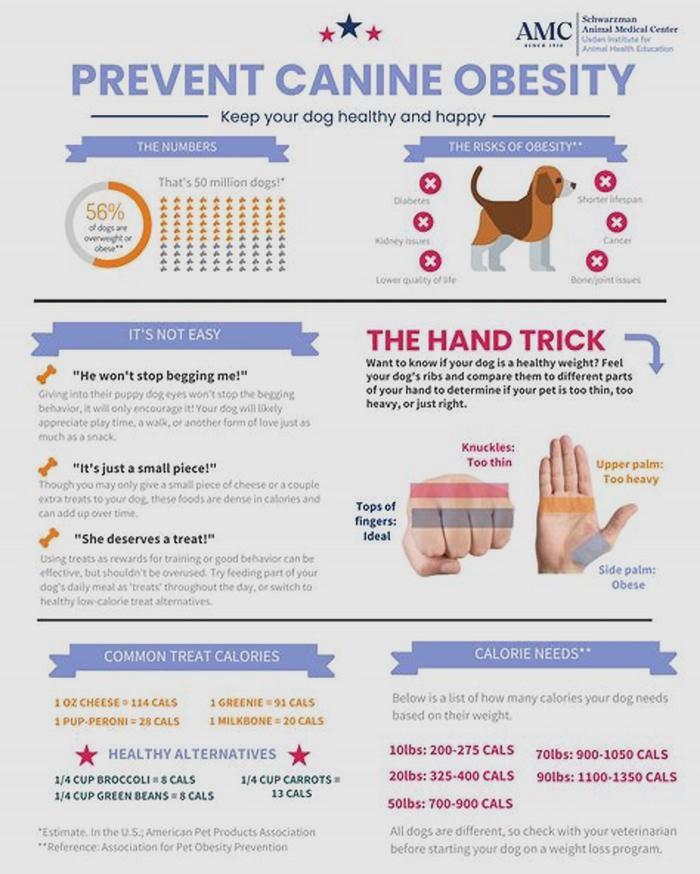Slimming Down Safely Strategies for Managing Canine Obesity

Effective weight-loss tips: Strategies to help your dog take off extra pounds
Obesity, a rampant problem in dogs, stresses your dogs joints and overall health. But you can help them! Start by weighing your dog every month. After consulting your veterinarian about your individual dog's needs, they might suggest a goal of lowering your dog's weight by 3-5% per month. These tips may help you achieve that.
Use a commercial weight-control diet
With the epidemic of overweight pets in our nation, pet-food manufacturers have developed a number of high-quality, tasty weight-loss labels. Nearly every manufacturer has at least one choice, sometimes by breed or by size.
Be sure you read the label to ensure that it is formulated to the Association of American Feed Control Officials' standards for adult maintenance and that it truly is lower in calories than what youre feeding now some arent!
The biggest benefits of this choice are that you can usually feed the same volume of food, and you are providing the proper amounts of nutrients that your dog needs to stay healthy.
Measure food accurately
If you want to stick with your current food, thats fine. Cut it back 10% (you can do it by volume, if its easier) and monitor your dog.
Use a measuring cup to accurately portion food for meals, and make sure to fill the cup so it is level and not heaping, says Dr. Leni Kaplan, senior lecturer in the Department of Clinical Sciences.
Limit treats
Monitor or significantly cut back on treats, says Dr. Kaplan. Many pets tend to carry extra weight simply because they get way too many snacks and treats.
Treats are often calorie-dense, meaning that even a few can throw off your dogs diet. Many trainers set aside part of one of the dogs meals to use as treats throughout the day.
Add veggies and water to your dogs meals
To help pets feel more full, add healthy veggies such as green beans to their kibble, or add water to their meals. When pets are well-hydrated, they feel less hungry, says Kaplan.
Plain canned pumpkin is a good option that many dogs enjoy. Adding a small amount of pumpkin (between one teaspoon and one tablespoon, depending on your dogs size) helps your dog feel more full and improves stool quality.
Adding water may take some experimentation. Some dogs enjoy slurping up kibble soup, while others prefer when the kibble has already soaked up the extra moisture. This can also help senior dogs or dogs who have dental pain.
Exercise
Just like us, dogs need exercise. Lengthen the daily walk by 10% per week. If time is a factor, can you add a little speed? If your dog enjoys playing ball, toss it a few extra times each day.
Always watch your dogs reaction to the increased exercise and move up gradually. If you note any difficulty with your dog's breathing (panting hard) or if they're clearly trying to slow things down, then stop. Discuss the possibilities of other health issues with your veterinarian.
This article has been reprinted with permission from the Cornell University College of Veterinary Medicines DogWatch newsletter, published by Belvoir Media Group. When you become a member of the Riney Canine Health Center, you will receive a free subscription to DogWatch.
Treatment - Obesity
Ifyou're living with obesity, your GP can offer you for advice about improving your lifestyle and losing and managing your weight safely.
Your GP can advise you about losing weight safely by eating ahealthy, balanced diet and regular physical activity.
They can also let you know aboutother useful services, such as:
- local weight loss groups these could be provided by your local authority, the NHS, or commercial services you may have to pay for
- exercise on prescription where you're referred to a local active health team for a number of sessions under the supervision of a qualified trainer
If you have underlying problems associated with obesity, such as polycystic ovary syndrome (PCOS),high blood pressure,diabetes or sleep apnoea, your GP may recommend further tests or specific treatment. In some cases, they may refer you to a specialist.
Information:Self-refer for help with your weight
If you need help managing your weight, you might be able to refer yourself directly to services that can help you, without seeing a GP.
To find out if there are any services in your area:
- ask the reception staff at your GP surgery
- check your GP surgerys website
- contact your integrated care board (ICB) find your local ICB
- search online for NHS weight management services near you
Diet
There's no single rule that applies to everyone, but to lose weight at a safe and sustainable rate of 0.5 to 1kg a week, most people are advised to reduce their energy intake by 600 calories a day.
For most men, this will mean consuming no more than 1,900 calories a day, and for most women, no more than 1,400 calories a day.
The best way to achieve thisis to swap unhealthy and high-energy food choicessuch as fast food, processed food and sugary drinks (including alcohol)for healthier choices.
A healthy diet should consist of:
- plenty of fruit and vegetables
- meals based on potatoes, bread, rice, pasta and other starchy foods (ideally you should choose high fibre and wholegrain varieties)
- somemilk and dairy foods or dairy alternatives
- some meat, fish, eggs,beans and other non-dairy sources of protein
- just small amounts of food and drinks that are high infat and sugar
Try to avoidfoods containing high levels of salt because they can raise your blood pressure, which can be dangerousfor people who are already living with obesity. Readsome tips for a lower-salt diet.
You'll also need to checkcalorie information for each type of food and drink you consume to make sure you don't go over your daily limit.
Some restaurants,cafs and fast food outlets provide calorie information per portion, although providing this information isn't compulsory. Be carefulwhen eating out because some foods can quickly take you over the limit, such as burgers, fried chicken, and some curries or Chinese dishes.
Read more about calorie counting.
Diet programmes andfad diets
Avoidfad dietsthat recommend unsafe practices, such as fasting (going without food for long periods of time) or cutting out entire food groups. These types of dietsdo not work, can make you feel ill, and are not sustainable because they do not teach you long-term healthy eating habits.
This is not to say that all commercial diet programmes are unsafe. Many are based on sound medical and scientific principles and can work well for some people.
A responsible diet programme should:
- educate you about issues such as portion size, making behavioural changesand healthy eating
- not be overly restrictive in terms of the type of foods you can eat
- be based on achieving gradual, sustainable weight loss rather than short-term rapid weight loss, which is unlikely to last
Very low calorie diets
Avery low calorie diet (VLCD) is where you consume less than 800 calories a day.
These diets can lead to rapid weight loss, butthey are not a suitable or safe method for everyone, and they are not routinely recommended for managing obesity.
VLCDs are usually only recommended if you have an obesity-related complication that would benefit from rapid weight loss.
VLCDsshould not usually be followed for longer than 12 weeks at a time, and they should only be used under the supervision of a suitably qualified healthcare professional.
Speak to your GP first ifyou're considering this type of diet.
Further information
For more information about diet and weight loss, read:
Exercise
Reducing the amount of calories in your diet will help you lose weight, but maintaining a healthy weight requires physical activity to burn energy.
As well as helping you maintain a healthy weight, physical activity also has wider health benefits. For example, it can help prevent and manage more than20 conditions, such as reducing the risk oftype 2 diabetes by 40%.
The Chief Medical Officers recommend that adults should do a minimum of 150 minutes moderate-intensity activity a week for example, 5 sessions of 30-minute exercise a week. Something is better than nothing, and doing just 10 minutes of exercise at a time is beneficial.
Moderate-intensity activity is any activity that increases your heart and breathing rate, such as:
- brisk walking
- cycling
- recreational swimming
- dancing
Alternatively, you could do 75 minutes of vigorous-intensity activitya week, or a combination of moderate and vigorous activity.
During vigorous activity, breathing is very hard, your heart beats rapidly and you may be unable to hold a conversation. Examples include:
- running
- most competitive sports
- circuit training
You should also dostrength exercisesandbalance training 2 days a week. This could be in the form of agym workout, carrying shopping bags, or doing an activity such astai chi.It's also critical that you break up sitting (sedentary) time by getting up and moving around.
Your GP, weight loss adviser or staff atyour local sports centre can help you create a plan suited to your own personal needs and circumstances, with achievable and motivating goals. Start small and build up gradually.
It's alsoimportant to find activities you enjoy and want to keep doing. Activities with a social element or exercising with friends or family can help keep you motivated. Make a start today it's never too late.
Read more about thephysical activity guidelines for adults and the physical activity guidelines for older adults.
You may need to exercise for longer each day to prevent obesity orto avoid regaining weight if you've been obese. To prevent obesity, 45 to 60 minutes of moderate-intensity activity a dayis recommended. To avoid regaining weight after being obese, you may need to do 60 to 90 minutes of activity each day.
Your GP or weight loss adviser will be able to advise you further about the type of exercise you should do and for how long taking into account your current fitness level and individual circumstances.
Further information
For more information about exercise, see:
Other useful strategies
Evidence has shown that weight loss can be more successful if it involves other strategies, alongside diet and lifestyle changes. This could include things like:
- setting realistic weight loss goalsif you're living with obesity, losing just 3% of your original body weight can significantly reduce your risk of developing obesity-related complications
- eating more slowly and being mindful of what and when you're eatingfor example, not being distracted by watching TV
- avoiding situations where you know you may be tempted to overeat
- involving your family and friends with your weight loss efforts they can help to motivate you
- monitoring your progress for example, weigh yourself regularly and make a note of your weight in a diary
Getting psychological support from a trained healthcare professional may alsohelp you change the way you think about food and eating. Techniques such ascognitive behavioural therapy (CBT)can be useful.
Avoiding weight regain
It's important to remember that as you lose weight your body needs less food (calories), so after a few months, weight loss slows and levels off, even if you continue to follow a diet.
If you go back to your previous calorie intake once you've lost weight, it's very likely you'll put the weight back on. Increasing physical activity to up to 60 minutes a day and continuing to watch what you eat may help you keep the weight off.
Medicine
Manydifferent types of anti-obesity medicines have been tested in clinical trials, but the only ones that have proved to be safe and effective for use on the NHS for weight management are orlistat, liraglutide and semaglutide.
Orlistat
You can only use orlistat if a doctor or pharmacist thinks it's the right medicine for you. Orlistat is available on prescription from your doctor, or you can buy it at a lower dose from a pharmacy. Products available directly from pharmacies are Alli and Orlos, which must be taken under the supervision of a pharmacist.
Orlistat works by preventingaround a third of the fat from the food you eat being absorbed. The undigested fat is not absorbed into your body and is passed out with your poo. This will help you avoid gaining weight, and may help you to lose weight.
You'll need to start eating a balanced diet and exercising regularly before beginning treatment with orlistat, and continue this during treatment and after you stoptaking orlistat.
When orlistat should be used
Orlistat will usually only be recommended if you've made a significant effort to lose weight through diet, exercise or changing your lifestyle.
Even then, orlistat is only prescribed if you have either:
- a body mass index (BMI) of 28 or more, and other weight-related conditions,such as high blood pressure or type 2 diabetes
- a BMI of 30 or more
Orlistat is not usually recommended for pregnant or breastfeeding women.
Before prescribing orlistat, your doctor will discuss the benefits and potential limitations with you, including any potential side effects.
Follow your doctor's advice about how to take it, and the instructions that come with your medicine.
How long to take it for
Treatment with orlistat should only continue beyond 3 months if you've lost 5% of your body weight. It usually starts to affect how you digest fat within1 to 2days.
If you have not lost weight after taking orlistat for3 months, it's unlikely to be an effective treatment for you. Ask your doctor or pharmacist, as you may need to stop your treatment.
Orlistat and other health conditions
If you're taking medicine for another serious health condition, such as type 2 diabetes, high blood pressure or kidney disease, it may be necessary to change the dose of your medicine. Speak to your GP before starting treatment with orlistat.
If you havetype 2 diabetes, it may take you longer to lose weight using orlistat, so your target weight loss after 3 months may be slightly lower.
Side effects of orlistat
Common side effects of orlistat include:
- fatty or oily poo
- needing the toilet to poo urgently
- pooing more frequently
- an oily discharge from your rectum (you may have oily spots on your underwear)
- farting (flatulence)
You're much less likely to get these side effects if you stick to a low-fat diet.
If you're takingtheoral contraceptive pilland you have severe diarrhoea while taking orlistat, use an additional method of contraception, such as a condom. This is because your body may not absorb the contraceptive pill if you have diarrhoea, so it may not be effective. Check the pill packet for advice.
Liraglutide and semaglutide
Liraglutide (also called Saxenda) and semaglutide (also called Wegovy) are weight loss medicines that work by making you feel fuller and less hungry. They're taken as an injection. Your doctor or nurse will show you how to take it.
Liraglutide is taken once a day, and semaglutide is taken once a week.
You can only take liraglutide or semaglutide if they're prescribed for you by a specialist weight management service. A doctor might recommend that you take one of these medicines if diet and exercise changes have not worked on their own.
You'll need to eat a balanced, reduced-calorie diet and exercise regularly while taking liraglutide or semaglutide.
Before prescribing liraglutide or semaglutide, your doctor will talk you through the benefits and limitations, including any side effects you might get.
When liraglutide should be used
Liraglutide is suitable for adults aged up to 75. It is not recommended if you're pregnant or breastfeeding or have certain health conditions, such as liver or kidney problems.
You'll only be prescribed liraglutide if all of these apply:
When semaglutide should be used
You'll only be prescribed semaglutide if you have health problems due to your weight and you have a BMI of either:
- 35 or more, or 32.5 or more if you're of Asian, Chinese, Middle Eastern, Black African or African-Caribbean origin
- 30 to 34.9, or 27.5 to 32.4 if you're of Asian, Chinese, Middle Eastern, Black African or African-Caribbean origin, and you meet other criteria to be treated by a specialist weight management service
It's not recommended if you're pregnant or breastfeeding or have certain health conditions.
How long to take liraglutide or semaglutide for
You'll have a review after taking liraglutide for 3 months, or after taking semaglutide for 6 months. You'll then usually only carry on taking the medicine if you've lost at least 5% of your body weight.
You can take semaglutide for a maximum of 2 years.
Surgery
Weight loss surgery, also called bariatric surgery, is sometimes used to treat people with severe obesity.
Bariatric surgery is usually only available on the NHS to treat people with severe obesity who fulfil all of the following criteria:
- they have a BMI of 40 or more, or between 35 and 39.9 and have a serious health condition that could be improved with weight loss, such astype 2 diabetes orhigh blood pressure
- for people from an Asian, Chinese, Middle Eastern, Black African or African-Caribbean origin, bariatric surgery may be considered for people with a BMI of 37.5 or more, or between 32.5 to 37.4 if they also have another health condition that could improve with weight loss
- all appropriate non-surgical measures have been tried, but the person hasn't achieved or maintained adequate, clinically beneficial weight loss
- the person is fit enough to haveanaesthesia and surgery
- the person has been receiving, or will receive, intensive management as part of their treatment
- the person commits to the need for long-term follow-up
People who have been diagnosed with type 2 diabetes in the last 10 years may be considered for a priority assessment for bariatric surgery if both of these apply:
- they have a BMI of 30 or more, or are of Asian, Chinese, Middle Eastern, Black African or African-Caribbean origin and have a BMI of 27.5 or more
- they are receiving, or will receive, assessment in a specialist weight management service
Treating obesity in children
Treating children living with obesity usually involves improvements to diet and increasing physical activity using behaviour change strategies.
The amount of calories your child should eat each day will depend on their age and height. Your GP should be able to advise you about a recommended daily limit, and they may also be able to refer you to your local family healthy lifestyle programme.
Children over the age of 5 should ideally get at least 60 minutes of vigorous-intensity exercise a day, such as running or playing football or netball. Sedentary activities, such as watching television and playing computer games, should be restricted.
Read more about the physical activity guidelines for children and young people.
Referral to a specialist in treating childhood obesity may be recommended if your child develops an obesity-related complication, or there's thought to be an underlying medical condition causing obesity.
The use of orlistat in children is only recommended in exceptional circumstances, such as if a child is severely obese and has an obesity-related complication.
Bariatric surgery isn't generally recommended for children, but may be considered for young people in exceptional circumstances, and if they've achieved, or nearly achieved, physiological maturity.
Further information
For more information about diet and exercise in children, read:
Page last reviewed: 15 February 2023 Next review due: 15 February 2026

